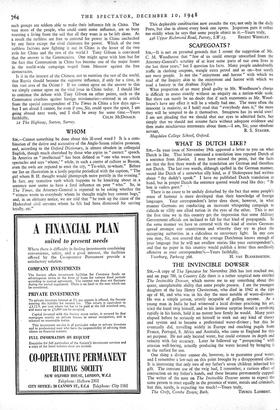WHOM
Sit,—Cannot something be done about this ill-used word ? It is a com- bination of the dative and accusative of the Anglo-Saxon relative pronoun, and, according to the Oxford Dictionary, is almost obsolete in colloquial English, though much cherished by those who aspire to " correct " speech. In America an " intellectual " has been defined as " one who wears horn spectacles and says ' whom,' " while, in such a centre of culture as Boston, even the owls are reputed to emit the cry, " To-whit, to-whom." Before me lies an illustration in a justly popular periodical with the caption, " The girl whom B. H. thought would photograph more prettily in the evening." In fact, any transitive verb which happens to be knocking about in a sentence now seems to have a fatal influence on poor " who." So, in The Times, the Attorney-General is reported to be asking whether the " witness wrote to everybody whom he thought might buy cement bags," and, in an obituary notice, we are told that " he took up the cause of the Hyderabad civil servants whom he felt had been dismissed for serving loyally, etc."
This deplorable coraniction now assaults the eye, not only in the daily Press, but also in almost every book one opens. Jespersen puts it rather too mildly when he says that some people object to it —Yours truly,
446 Upper Richmond Road, Putney, S.W.i5. ERNEST WEEKLEY.














































 Previous page
Previous page